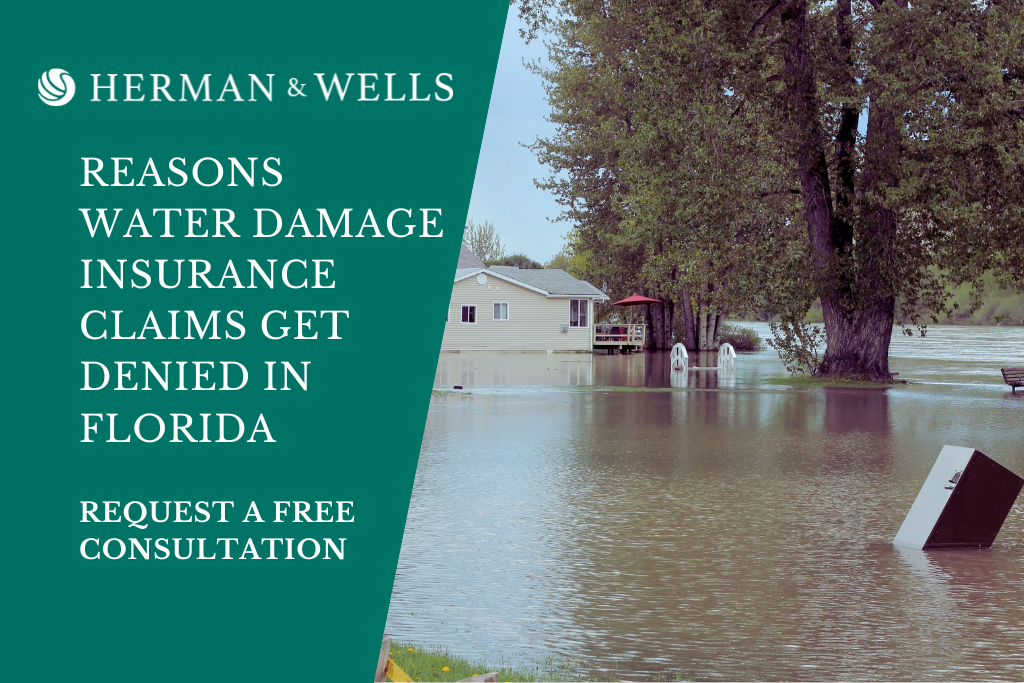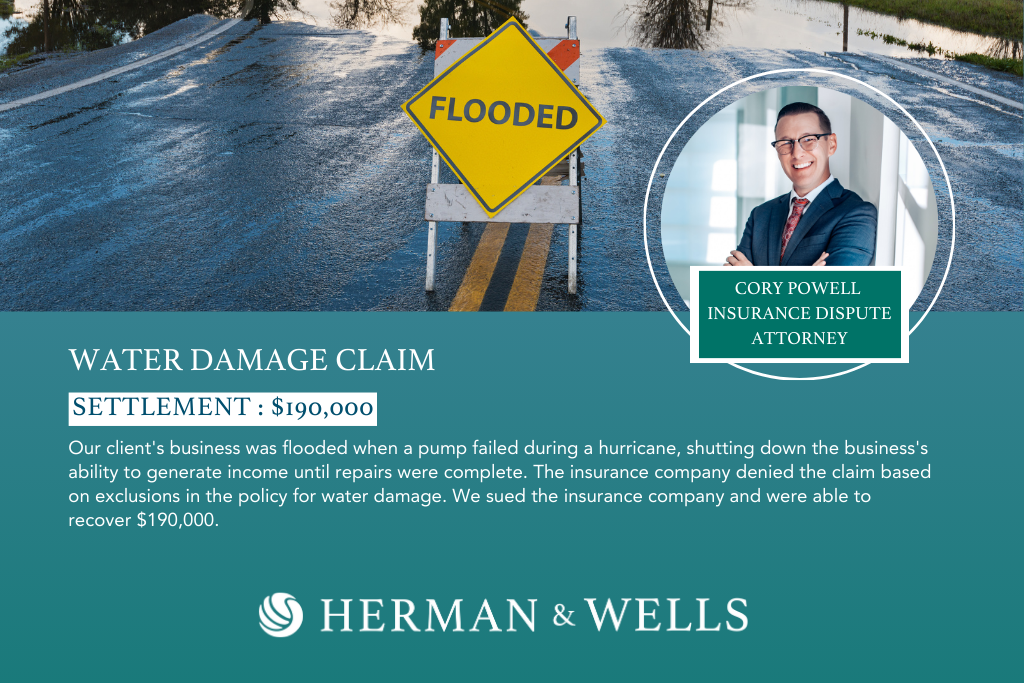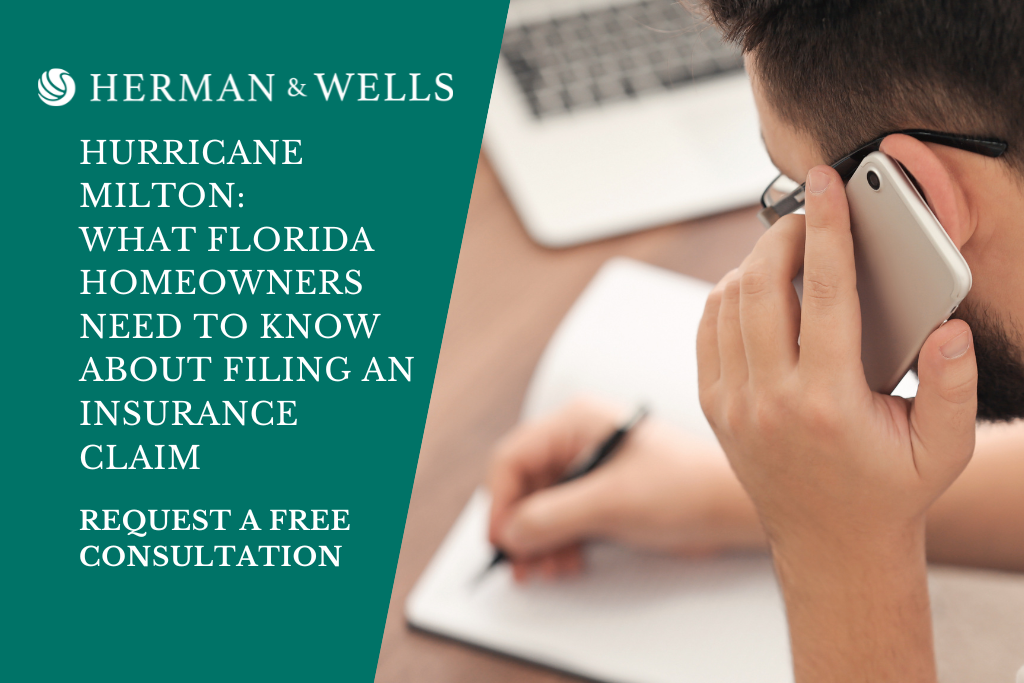If you’re a Florida homeowner, it can be difficult to know what to do when water damage occurs. Water damage is one of the most common causes of property loss in the state, accounting for millions of dollars in damages each year. Fortunately, homeowners may be able to file a water damage claim with their insurance provider and receive compensation for the damage. Despite this, water damage insurance claims often get denied.
If your recent water damage insurance claim has been denied, contact Herman & Wells for assistance. Our water damage insurance claim lawyers have years of experience helping Florida homeowners with water damage claims and can help you build a strong case for getting your claim approved. In this blog post, we’ll cover the most common reasons Florida water damage insurance claims get denied.

The Cliff Notes: Key Takeaways From This Post
- 1Water damage incidents not typically covered in Florida include flooding from rivers or coastal waters, intentional acts, plumbing in poor condition prior to the incident, sewer backup and overflows, and mold from water damage.
- 2If water damage is gradual due to a leak over time, it may not be covered.
- 3Insurance providers typically require proof of the water damage incident for claims and may deny a claim if documentation is missing or inaccurate.
- 4Repairing any damage before an insurance claim is made can complicate or result in denied claims.
- 5Insurers may deny claims if sufficient preventative measures weren’t taken to mitigate further water damage or deadlines were missed when filing the claim.
- 6For wrongfully denied claims, a lawyer with experience handling such cases can help build a strong case against your insurance provider.
The Specific Water Damage Incident Wasn’t Covered By Your Policy
When you buy insurance, you agree to certain terms and conditions. This often includes exclusions. Some water damage incidents aren’t covered by your policy – for example, water damage caused by flooding from a river may be excluded from a policy. If the water damage wasn’t explicitly included in your policy, it may be denied.
What Kinds Of Water Damage Incidents Aren’t Typically Covered In Florida?
In Florida, some typical water damage incidents are not typically covered under insurance policies. These include:
- Flooding from rivers or coastal waters
- Intentional acts of vandalism or other malicious behavior
- Damage caused by plumbing that was in poor condition prior to the incident
- Sewer backup and overflows
Mold from Water Damage
Mold is covered by your home insurance if it is the result of water damage related to a common peril. If situations such as burst pipes or an AC system overflow allow mold to grow, your homeowner’s insurance will cover all or some of the mold removal costs because the mold is considered an extension of water damage.
The Water Damage Developed Over Time Due To A Gradual Leak
Ordinarily, leaks manifest gradually. The destruction becomes worse over time as water accumulates. Insurance providers presume that it is the homeowner’s role to remain on top of plumbing and maintenance problems in their houses. That means they anticipate you to notice and take action sooner rather than later.
If water damage is gradual due to a leak, over time it may not be covered. Insurance providers typically only cover sudden water damage incidents that happen suddenly, such as a pipe bursting or a water heater leaking. Be sure to check your policy for water damage conditions.
What About If You Were Unaware Of The Leak Prior To the Damage Becoming Visible?
It’s possible that water damage may be denied even if you were unaware of the leak prior to the damage becoming visible. Insurance providers typically have strict standards for water damage claims and may require proof of maintenance or upkeep before approving a claim. Not all leaks will be obvious and noticeable.
It’s common for homeowners to not notice the leakage until the damage is already done. For example, leakage usually occurs within walls unbeknownst to a homeowner. The damage seems sudden to the owner and they weren’t avoiding routine maintenance. However, from the perspective of the insurance companies, the situation looks different, which is why insurance companies avoid offering coverage for leakage and seepage in the first place.
Your Claim Was Missing Critical Documentation
Your water damage insurance claim may be denied if it’s missing critical documentation. Insurance providers typically require proof of the water damage incident, such as photographs or repair estimates from a professional contractor. Without this evidence, your water damage claim may be denied.

Your Proof Of Loss Form Was Inaccurate
If your proof of loss form is inaccurate, it may be denied. Proof of loss is a document that outlines the water damage and repairs that need to be done, including repair cost estimates. Insurance providers review this document closely and may deny your water damage claim if it doesn’t meet their standards.
This form must include an accurate description of the water damage incident, along with repair costs and other important information. Anything that is incorrect or missing can result in a water damage claim being denied. If you have had a water damage insurance claim denied in Florida, contact Herman & Wells for assistance.
Why You Shouldn’t Make Repairs Before Filing Your Water Damage Insurance Claim
When water damage occurs in your home, it’s important that you don’t make any repairs before filing your insurance claim. Making repairs can complicate the water damage claim process and can even result in a denied water damage insurance claim. It’s best to wait until after you have filed the water damage insurance claim and received approval before starting any repairs.
Not Taking Sufficient Preventative Measures To Mitigate Further Water Damage
Insurance providers may deny water damage claims if they feel that you failed to take sufficient preventative measures to mitigate further water damage. For example, if water damage occurs and you don’t immediately move furniture away from the affected area or turn off water valves, your water damage insurance claim may be denied.
At Herman & Wells, our water damage insurance claim lawyers can help you through the water damage insurance claim process in Florida. We will review your water damage incident and provide guidance on how to proceed with filing an insurance claim.
You Missed Critical Deadlines When Filing Your Water Damage Claim
In Florida, water damage insurance claims must be filed within a certain period of time in order to be valid. Missing critical deadlines when filing your water damage claim can result in its denial. It’s important to properly document all water damage incidents and file the water damage insurance claim as soon as possible after the incident occurs. The statute of limitations for filing a water damage claim in Florida is typically two years from the date of the water damage incident, but this time frame may vary depending on your policy.
What Can You Do If Your Water Damage Claim Was Wrongfully Denied?
If your water damage claim was wrongfully denied, it’s important to have an insurance dispute lawyer review the water damage incident and provide guidance on how to proceed. A lawyer with experience handling denied water damage insurance claims can help you build a strong case against your insurance provider and ensure that you receive the coverage you are entitled to.
At Herman & Wells, our water damage insurance claim lawyers have extensive experience representing water damage victims in Florida. We can help you understand your water damage insurance policy and assist with filing a water damage claim. Request a free claim review if you are ready to talk to a lawyer and learn how our firm can help with your water damage insurance claim.





